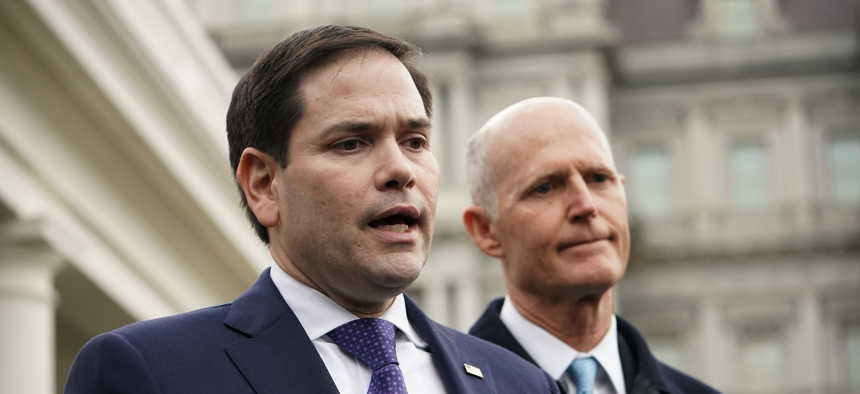Policy
Rick Scott, Marco Rubio to federal workers: Get back to the office
The SHOW UP Act, which narrowly passed the House in February, requires federal agencies to revert to their telework policies prior to the COVID-19 pandemic.

Sens. Marco Rubio (left) and Rick Scott speak to reporters after a meeting with then-President Donald Trump, outside of the West Wing of the White House in Washington, D.C., Jan. 22, 2019. Photo by MANDEL NGAN/AFP via Getty Images
A group of Republican U.S. senators – including Florida's Marco Rubio and Rick Scott – introduced the companion to a piece of House-passed legislation that would require federal agencies to revert to pre-pandemic telework policies – a sign that the Biden administration’s recent efforts to counter GOP criticism of workplace flexibility were ineffective.
The Stopping Home Office Work’s Unproductive Problems (SHOW UP) Act (H.R. 139 and S. 1565) would require agencies to “reinstate and apply the telework policies, practices and levels ... in effect on December 31, 2019,” within 30 days of the bill’s enactment.
If agencies want to expand telework beyond 2019 levels, they would have to submit an Office of Personnel Management-certified plan to Congress first.
“I’ve spent my life leading organizations of every shape and size," Scott said in a statement. "I know from firsthand experience the importance of having an effective and dedicated team that shows up to work.
"It’s clear that the COVID-era telework policy of the federal government is both a waste of taxpayer dollars and inefficient. It’s time to change Washington so it actually works for the American people, which means federal employees need to work from their offices.”
The bill stemmed from congressional Republicans’ ire at a number of service backlogs at federal agencies, including the Social Security Administration and Internal Revenue Service, which they attributed at least in part to federal employees working remotely during the COVID-19 pandemic.
Democrats, federal employee groups and agency officials countered that those backlogs were the result of temporary challenges posed by the pandemic, such as social distancing requirements, and chronic understaffing, not telework. The House approved the legislation in February by a 221-206 vote.
In the intervening months, the Biden administration has taken multiple steps to scale back telework, coinciding with the recent end of the federal public health emergency declaration.
In April, an Office of Management and Budget memo instructed agencies to “substantially increase meaningful in-person work at federal offices” and develop new work environment plans reflecting this new ethos.
The first iteration of those plans was due earlier this month. The Office of Personnel Management also ended the use of “maximum telework” as part of the federal government’s operating status on May 11.
Those olive branches did not satisfy a group of seven Republican senators, led by Sen. Marsha Blackburn, a Tennessee Republican. In a statement announcing the Senate version of the bill, she repeated the same contested arguments claiming telework is responsible for agency service backlogs.
“As the public health emergency officially ends in the United States, so should the pandemic-era telework policies for federal bureaucrats,” she said. “I regularly hear from Tennesseans struggling to get ahold of a federal agency because of the massive backlog created by employees not being in the workplace. It’s illogical that VA employees are able to work from a bubble bath, while organizations across the country have safely reopened.”
Sen. Kevin Cramer, a North Dakota Republican, went further, accusing federal employees of indolence for working remotely.
“Executive agencies have used the COVID-19 pandemic as an excuse for laziness for too long,” he said. “Our public servants should be doing just that — serving the public. Our bill ensures they come back to the office to do the work American taxpayers expect from them.”
The legislation likely faces stiff resistance in the Senate, thanks to Democrats’ narrow control over the body and the 60-vote threshold to bypass a filibuster threat.
But such a logjam may not exist in the White House, as, unlike other Republican legislation in recent months, President Biden failed to issue a veto threat ahead of the House bill’s passage earlier this year.
A version of this story was first published on Government Executive.
NEXT STORY: DeSantis vs. Trump: How their policy positions will stack up in a 2024 face-off
